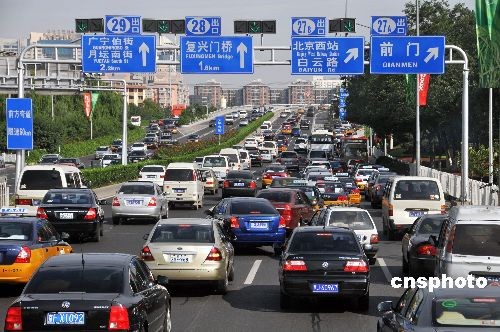- 政策解读
- 经济发展
- 社会发展
- 减贫救灾
- 法治中国
- 天下人物
- 发展报告
- 项目中心
机动车排放是造成雾霾天气的重要污染源
关键词: 中国 双语 北京 污染 雾霾 空气 机动车 排放 污染物 尾气
|
|
编者按:过去的一周,在恶劣的天气条件下,北京和中、东部地区很多城市都经历了严重的空气污染。数个空气质量监测点都出现PM2.5爆表的情况。这种前所未有的严重污染引发了国内外媒体的广泛关注和报道,很多市民也表达了对恶劣空气质量的不满。国际清洁交通委员会高级研究员Vance Wagner撰文指出,机动车排放是造成雾霾天气的重要污染源。

国际清洁交通委员会高级研究员Vance Wagner认为,由于人们在近距离内直接暴露于机动车排放污染下,因而机动车排放在人口相对密集的城区成为最大的直接影响人类健康的污染源。随着北京和其他中国城市机动车数量的迅猛增长,机动车带来的污染在总体空气污染中占的比重也越来越大。严格控制机动车排放的重要性应不亚于对待其他污染源如工厂和电厂。
中国需要全国性的、严格的机动车污染防治政策。由于车辆(尤其是重型货车和长途客运车辆)的流动性,只有在全国范围内实施同等严格的标准政策才能确保机动车污染得到切实治理而非转移。近年来,北京市采取了一系列针对其辖区范围内强有力的车辆污染防治措施(如实施了全国范围内最严格的新机动车排放标准,及最严格的油品标准,并淘汰了50多万辆高污染车辆等)。然而,从空气质量改善上北京仍然举步维艰。这主要是由于空气污染的流动性和区域性,大部分北京的污染(约37%-70%)来自于周边地区的固定和移动污染源。
Vehicle Pollution Control Critical for Cleaner Air
Vance Wagner, a senior researcher from the International Council on Clean Transportation (ICCT) believes stringent controls to mitigate the pollution impacts of China's motor vehicles must be a key priority in Beijing's strategy to clean up its air.
He believes Beijing has made a series of impressive steps towards controlling pollution within its own boundaries in recent years. For example, Beijing already has the most stringent vehicle standards and the highest fuel quality standards in the country, and has scrapped over 500,000 high-polluting vehicles over the past two years.
However, the city still struggles to improve air quality because perhaps 34 to 70 percent of Beijing's pollution is regional, coming from dirty vehicles and industrial sources from the surrounding provinces.
To combat the problem, Wanger suggested China must take similar actions at the national level.
"Vehicles are typically by far the largest source of human exposure to air pollution in densely packed urban areas. Plus, the contribution of vehicle emissions to air pollution in China is increasing as the population of motor vehicles in Beijing and around China continues to grow rapidly," he wrote in his blog.
The Air Quality Index for PM2.5, minute particles which can damage the lungs, in most parts of the capital exceeded 500, the highest possible index rating, for several days this past month.
The Beijing Municipal government adopted emergency response measures in some areas to deal with the heavy pollution, including halting outdoor sports activities for primary and middle schools and suspended operations at polluting construction sites and businesses.
Opinion articles reflect the views of their authors, not necessarily those of Chinagate.cn.
